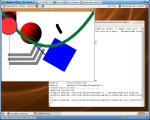
So, I decided to try porting NME to Linux. The first thing you do is find an empty hard drive, download an ISO, and off you go, right? Wrong. I did this – but I wanted to keep my windows partition, without risk of rooting it over, so I didn’t over write my MBR. Then, I could not actually boot my linux partition. Eventually I got around this by booting from a rescue CD (I do not, and never will again, own a working floppy driver) and specifying my /dev/sd partition in a bit of a round about sort of way. Anyhow, I got Linux booting (with a little bit of pain per boot – but I could live with this), but then the wireless network did not work. This I could not live with, so I though about resurrecting some crappy old hardware I have lying around, but in the end I sought, and found, an infinitely better solution.
The answer is virtualization! I can’t overstate how much easier this was than actually getting the hardware together. First, I downloaded the free version of [vmware’s “player” product](http://vmware.com/products/player/), and then the Ubuntu 7.1 virtual machine, that included a dev environment [http://jars.de/linux/ubuntu-710-vmware-image-download-english](http://jars.de/linux/ubuntu-710-vmware-image-download-english). The reference to “jars” seems to be a java reference, but we wont hold that against them. It “just worked”. I edited the xorg.conf file to change the keyboard to US, (so I could use the ‘|’ key), and that was about it. With only mimimal clicking, the network was fully working, *and* I could switch to my windows emails etc. This was what I wanted – much better than dual boot. Compiling NME was just a matter of adding the “dev” version of packages (vim, subversion, SDL, SDL\_miver, SDL\_image, TTF) with the GUI “Synaptic Package Manager”, which also “just worked”.
The download from code.google, via svn, worked easily once I added the “subversion” package.
Then a little [makefile](http://nekonme.googlecode.com/svn/trunk/project/makefile) to bring it all together. I had to make some code hacks. I don’t know if this is a gcc “bug” or “feature”, but when I tried to call a class member function, that was templated on an int, eg:
int x = Class.Member<4>(10);
the gcc compiler thought I was using “operator<", which is a bit of a shame.
I also had a quick go at static linking, via the ".a"s, rather than the ".so"s, but the linker told me I needed a "version section" for one of the SDL symbols, so I gave up.
The image you see is in the top left is of a window, on my windows desktop, running a virtual machine, running ubuntu, running the neko virtual machine, running a neko script linking to the Linux version of NME. And running it very well, I might add.
The only problems at the moment, are text, when a font is not supplied, the "mod" music in the "blox" demo, and OpenGL on my setup. The PNG, JPG, WAV and OGGs stuff all worked first time.
I think I might be able to get the music going, if I get the right plugin dso.
Also, I'm not sure about what ".so" files need to be distributed with the program to resolve all the dependencies. Any SDL linux guru have any comments on this?
